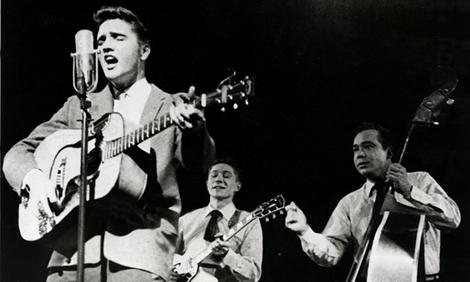The rumors surrounding Elvis Presley and allegations of racism in the 1950s primarily focus on the concept of cultural appropriation – the idea that Elvis, a white artist, gained success by borrowing elements from African American musical traditions without appropriately crediting or acknowledging the originators of those styles.

Elvis's musical roots were undoubtedly intertwined with the blues, gospel, and rhythm and blues genres pioneered by black artists. His early influences included performers like Big Mama Thornton, Arthur Crudup, and Junior Parker. As he synthesized these styles, critics argue that he walked a fine line between appreciation and appropriation.
One aspect of the allegations centers on the racial dynamics of the time. In the 1950s, America was grappling with segregation, and the music industry mirrored these societal divisions. There were separate charts for "race records" (featuring music by black artists) and "pop records" (featuring music by white artists). Elvis, with his charismatic performances and groundbreaking sound, seemed to bridge this racial gap, garnering popularity across both charts. However, the accusations assert that his success was part of a broader system that advantaged white artists over their black counterparts.

The cultural landscape of the 1950s was complex, and Elvis's rise coincided with a transformation in American music. While he brought black-influenced music to a wider, predominantly white audience, some argue that he did not adequately credit the black artists who paved the way for this musical evolution. The industry's tendency to categorize and market music along racial lines also played a role in shaping Elvis's trajectory.
Critics of Elvis's alleged appropriation point to specific instances, such as his famous rendition of "Hound Dog," originally recorded by Big Mama Thornton. Elvis's version became a massive hit, overshadowing Thornton's earlier recording. This case, among others, highlights the power dynamics within the music industry and raises questions about credit, recognition, and the exploitation of black artists.

Defenders of Elvis argue that he genuinely admired and respected the black musicians who influenced him. His relationships with black artists, both personal and professional, are often cited as evidence of his appreciation for their contributions to music. Collaborations with renowned black musicians like guitarist Scotty Moore and his association with Sam Phillips, the owner of Sun Records, further complicate the narrative.

Mahalia Jackson, a gospel and soul singer and a close friend of Elvis, publicly supported him against allegations of racism. Jackson, who was a vocal advocate for civil rights, saw Elvis as someone genuinely committed to breaking down racial barriers through music. She believed that Elvis's influence helped introduce black music to a broader and more diverse audience.
In the midst of these rumors, it's crucial to acknowledge the historical context. Elvis Presley's career unfolded in a time of racial tension, and while his impact on breaking down racial barriers is undeniable, the question of whether he did so at the expense of proper recognition for black artists remains contentious. The nuances of Elvis's relationship with black music, coupled with the racial dynamics of the 1950s, create a complex narrative that continues to be scrutinized in discussions about cultural appropriation and racial inequality in the history of American music.



